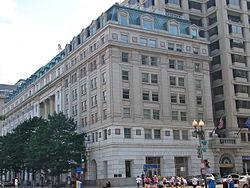1945-2013: Presevationist Joseph Grano, Defender of Rhodes Tavern
By • January 6, 2014 0 1529

Joseph N. Grano, Jr., was an exemplary man—a kind of Don Quixote of the Italian-American stripe in the sense that he seemed to pursue impossible dreams and fight what often turned out to be unbeatable foes.
Grano was a man who believed in preserving aspects of history in terms of historic buildings, historic figures and events. In this historic city where you can’t go too many blocks or even parts of blocks without tripping over a memorial statue, historic plaques and such, you would think this was a no brainer. However, when you figure that the competing interests are about building office buildings, renovating historic homes or forgetting obscure parts of history, it’s not too hard to figure why Grano, a man of redoubtable energy, did not often succeed in his most passionate pursuits.
Grano was the son of Italian immigrants. Born in the Bronx, he came to Washington in 1977 to work for the Veterans Administration, armed with a law degree and a bachelor’s degree in philosophy from St. John’s University. The combination probably defined him in his pursuits. He quit his legal work 30 years ago and set about embracing and trying to save Rhodes Tavern from demolition.
The Rhodes Tavern imbroglio became his claim to fame, and it’s why Grano is remembered to this day. Oliver T. Carr, Jr., then the head of one of the city’s major development and construction companies, was planning to demolish the Rhodes Tavern, an old three-story building at 15th and F Streets, NW. The building dated back to 1799, which made it the oldest commercial structure in downtown Washington — and to Grano’s way of thinking, a site that should be saved and preserved for posterity and history. It had been a tavern, a dining place, polling place and a bank. By the 1970s, it was also run down, a building which many considered an eyesore. In any case, it was in the way of the Metropolitan Square project across the street from the Treasury Building.
For several years, Grano was in the forefront—very visible, very noisy, very everywhere—in the fight to save Rhodes Tavern. He pestered then Mayor Marion Barry, city council members, legislators pretty much on a daily basis. If a crowd was gathered any where, if there was a public meeting somewhere, there was Grano with his “Save Rhodes Tavern” sign. The Washington Post obituary includes a large picture of Grano, intensely eying the camera, surrounded by signs: “Have a Heart, Mr. Carr”, “Rally to Save the Historic Rhodes Tavern” and “Rhodes Tavern, D.C.’s First Town Hall, It Must Not Be Moved or Destroyed.”
In retrospect, it’s clear that Grano’s cause never had a chance to succeed. Rhodes Tavern was demolished in September 1984. But long-term and short term, Grano may have had the last word. The year before the destruction of Rhodes Tavern, D.C. voters approved a pro-preservation ballot initiative, which had been proposed by Grano. And in 1999, Grano managed to get a plaque commemorating Rhodes Tavern on the site.
Grano was proud of his Italian heritage and quite active in Italian groups and organizations. He led the effort to have Congress honor the 19th-century Italian architect Constantino Brumidi — responsible for the decorative aspects of the Capitol Dome — on the bicentennial of the architect’s birth.
Grano was also a Republican, which made him fairly unique in Washington in those days, but he also pursued statehood and advocated exempting D.C. residents from paying federal taxes. He died of complications from a stroke Nov. 24 at the age of 68.

